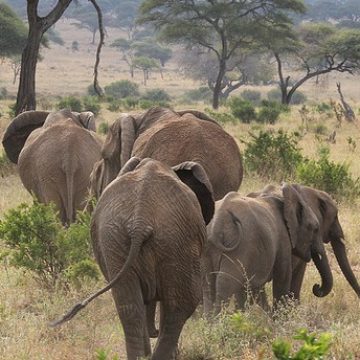It’s 4:46 a.m. on the Serengeti plains in Tanzania, Africa. I’m lying on my back staring at the roof of my tent. The unusual-for-August torrential lightning storm that swept across the savannah earlier in the evening has almost entirely subsided when I hear the piercing cry of a wounded animal just metres from my tent’s entry flap. I stare through the screened canvass window into utter blackness. The kerosene lanterns of our camp and the small bonfire have both long since burned out.
I feel a sharp pain stinging my left forearm as a human hand extends in a vice grip. Apparently my wife heard it, too.
We now stare together, unblinking and unmoving out the window. We can hear a distinct chuffing sound. It reminds me of the tiny sneezes my cat back home in Toronto used to make as he licked at his food bowl. Typical feline sounds. Except these aren’t tiny.
I can make out the cast-iron bell on the small wooden night table beside me in our tent. “Ring if you need anything,” our camp guide had said before we tucked in for the night. What if I need a pride of lions relocated from the stoop of my tent? Do lions react well to ringing bells? I wish I had asked these questions six hours ago.
The chuffing is getting closer. We can make out the sound of grass bending and snapping. Something is purring loudly. I think my arm is bleeding now. The sounds continue for the longest 12 minutes of my life.
In the morning, we emerge from our tent to a glorious African sunrise. Next door, I poke my head into the tent of my nine- and seven-year-old daughters. The decision to allow them to bunk together in their own neighbouring tents in the middle of the bush for the past week now seems a bit ill-considered. Yet, they’re sound asleep. As I poke and prod them to get ready for today’s game drive, they claim to have heard nothing last night. No buckets of rain. No lions. “Can we have hot chocolate for breakfast?” Suddenly my concern seems misplaced.
I shuffle over to the dining tent, noticing for the first time that these safari camps lack any sort of fencing. I accept a cup of steaming Tanzanian coffee from our guide, Charles, and can hear eggs frying on the propane grill out back. The memory of three hours ago feels cloudy and fuzzy in my mind. Did we really hear what I thought we heard? Must just be a silly tourist dream. Maybe I have malaria, I muse when my reverie is interrupted. “Did you hear the lions hunting that zebra?” Charles is gulping his own coffee with a big grin on his face. “Pretty amazing. They were so close! Would you like more coffee?”
On a Tanzanian safari, even when you can’t see anything at all, the sights are absolutely awe-inspiring.
And what we saw was absolutely incredible. In the days before my nocturnal brush with nature, we watched in rapt amazement as a lioness zig-zagged madly at high speed in a failed chase with a wildebeest who had strayed a few feet too far from his herd. My girls’ eyes popped out of their heads when we came across a massive male lion sitting regally in front of a fresh buffalo carcass. The buffalo’s face had been eviscerated and its entrails were spilled out over the golden grass as the lion tore strips of flesh from its belly. Further down the road our luck with lions continued as we stopped within three metres of a honeymooning pair. The male mounted his lioness and the two took turns roaring at each other, completely ignoring the sounds of human jaws clanging off the metal floor of our safari trucks.
We stopped at a fetid pool overflowing with gargantuan hippopotami stacked on top of each other like a giant fleshy Jenga tower. The hippos slapped the water loudly with their powerful stubby tails giving off regular guffaws sounding eerily like Jabba the Hutt laughing to the entertaining contortions of slave Leia. Every so often an errant hoof accidentally pressed into the face of some hippo lower down on the tower and all hell broke loose as the pool erupted into a seething cauldron of hippo madness. Giant mouths flexed open as if on hinges to reveal stained yellow teeth the size of steak knives.
One day the kids committed to counting the number of elephants we could spot. They gave up at 176. We hadn’t yet stopped for lunch.
He came for the wildlife but fell in love with the people. Stay tuned for part two in this ongoing series as The Crime Traveller introduces you to the children of Tanzania and the Maasai tribe.
Edward Prutschi is a Toronto-based criminal defence lawyer. Follow Ed’s criminal law commentary (@prutschi) and The Crime Traveller’s adventures (@crimetraveller) on Twitter, read his Crime Traveller blog, or email ed@thecrimetraveller.com.



